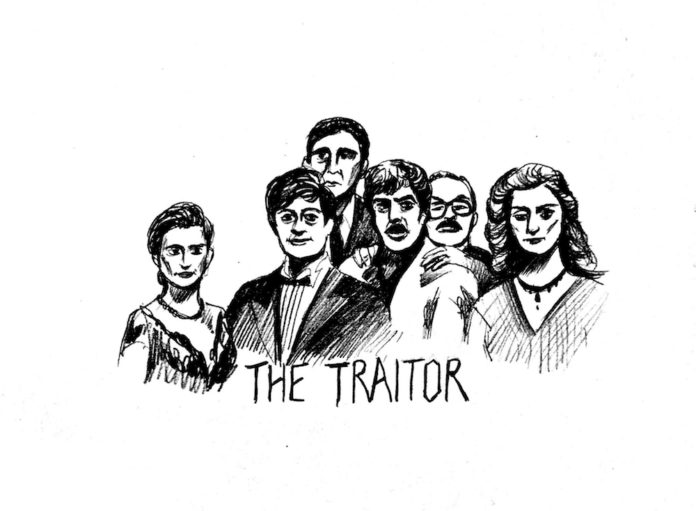In Martin Scorsese’s gangster film “Goodfellas,” Robert De Niro famously delivers the line “You learned the two greatest things in life: never rat on your friends, and always keep your mouth shut.” These instructions imply that there is an honor code between members of his New York crime family. He warns that cooperating with law enforcement is an act of ultimate betrayal. Italian director Marco Bellocchio examines this tenet of organized crime in his latest crime-biopic “The Traitor.” With a lengthy runtime of 134 minutes, the film follows the life of Tommaso Buscetta as he transitions from Sicilian mafia boss to federal informant between 1980 and 2000. Released on the heels of Scorsese’s “The Irishman,” “The Traitor” offers a fresh take on the tangled relations between the Mafia and political institutions. Bellocchio shows how Buscetta’s solemn quest for personal redemption brought down Italy’s Cosa Nostra during the 1986 Maxi Trial. This historic trial went on for six years and eventually led to the conviction of 366 mobsters. Buscetta’s testimony exposed an unprecedented amount of information about the existence of the Mafia. He was forced to live out the rest of his life in long phases of witness protection as one of many consequences for breaking De Niro’s golden rule.
By dignifying an informant, Bellocchio is able to manipulate conventions within the gangster movie genre. We often expect that revealing information to help the police is one mark of a character’s demise, not a new beginning. Despite Buscetta’s financial success, he appears disillusioned with life in the Mafia. Palermo, Italy is noted as the heroin capital of the world when the film opens in 1984. The circulation of a toxic substance stains its community. Early scenes show moments of celebration spoiled by reminders of addiction within the family. The loyalty espoused between members of the family no longer inspires Buscetta. He is conflicted about his role as “the boss of two worlds” even before he leaves for Brazil.
Bellocchio complicates his character studies by showing the ugly side of their materialism. Instead of glamorizing the Mafia, he goes deeper than simple sentimentality. Trafficking heroin makes them extremely wealthy, but it also brings about a rotten conscience. They are collectively blinded by their at-all-costs pursuit of achieving aristocracy. Buscetta believes it takes character, not just money, to sustain such a large operation. In search of a more fulfilling life, he disappears to Brazil with his wife and small child. The Mafia resorts to brutally killing several of his relatives with the hope of drawing him back home. Bellocchio prepares his audience to expect the worst when he throws up a barrage of cold-blooded executions on screen. Innocent and unsuspecting citizens are targeted due to simple name relation. Two of Buscetta’s sons are eliminated by his closest friend and confidant. The Mafia starts to consume itself.
As Buscetta scrambles to respond, he is arrested and sent back to Italy as the state’s witness. The government recognizes that if they get his testimony, it will condemn the entire mob. They agree to guard his wife and child in the U.S. and promise him a life in protection in exchange for every secret. “The Traitor” is calling back to De Niro, questioning if a true leader must be loyal to the people responsible for the deaths of their loved ones. Buscetta is willing to wear the label “snitch” if it means he may expose the Mafia’s empty principles. This is a twisted method for revenge when compared to the typical actions of a protagonist in a gangster movie.
Lead actor Pierfrancesco Favino’s well-worn demeanor and moral ambivalence are impressively believable. His performance as Buscetta is not one for the ages, but it conveys the seriousness that the subject demands. Bellocchio opens the film up during the courtroom scenes, where the trial is given the feeling of a circus. It underscores the fragility of Italy’s judicial system as judges are both intimidated and fascinated by the situation. They suspend decorum and indulge the petty griping between old associates and partners. One man who is supposed to testify physically sews his own mouth shut in a refusal to cooperate. The ping-pong style of back-and-forth insults within the courtroom creates humor out of chaos.
In contrast with other cinematic portrayals of the Mafia, Buscetta’s painful awareness of how paranoia threatens to swallow him whole offers a fascinating look into the will of an individual within a tangled social system.
![]()































